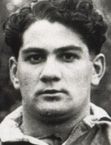1947–48 Australia rugby union tour of Britain, Ireland, France and North America
The nine-month journey was one of the last of that era of epic tours when transport was mostly by ship and when the tourists were whole-heartedly welcomed by rugby fans and townships, civic officials and royalty.
The legacy of Johnnie Wallace's leadership of 1927–28, of Cyril Towers and the credo of galloping rugby as played at his Randwick club in Sydney had some bearing on this but Batchelor also suggests that the everyday competition for public attention between the two rugby codes caused the Australian game (both in Sydney and Brisbane) to need to match the speed and open play of the 13-a-side code.
Bill McLean had been selected in the 1939 side who'd travelled to England under captain Vay Wilson and were promptly turned about upon the declaration of war without playing a match.
He had captained Australia's first post-war Wallaby sides on four occasions against the All Blacks and his return to the British Isles was in some ways a completion of unfinished business.
He had impressed in his first state and national representative starts a year earlier but in a squad of veteran campaigners including Graham Cooke and Phil Hardcastle his vice-captaincy was a surprise and an indication that he was being groomed for the future.
Allan was leading a squad comprising war veterans in Ken Kearney, Col Windon, Eddie Broad and Neville Emery; three qualified medical practitioners in Phil Hardcastle, Doug Keller and Clem Windsor; and a mixture of new and experienced Wallabies.
Shehadie reports that Arnold Tancred and McLean coached and trained the 1947–48 side with vigour while Jeff Noseda took care of tour administration.
He would constantly remind us that we would only be remembered for the number of matches we won"[5] and goes on to quote Jack Pollard: "The only criticism of Tancred was that relied perhaps too heavily on the team's proven stars and did not give newcomers many opportunities.
They departed Australia from Fremantle after crossing the Great Australian Bight, next docking in Colombo, Ceylon where they were welcomed and entertained by the expatriate community like the 1927–28 Waratahs before them.
Back in Britain after the France Test, the Wallabies met the British Barbarians in their inaugural match against an international team – such fixtures would thereafter become a regular event against touring national southern-hemisphere sides.
[7] AUSTRALIA: Brian Piper, Arthur Tonkin, Trevor Allan, Max Howell, Terry MacBride, Neville Emery, Cyril Burke, Eric Davis, Ken Kearney, Eric Tweedale, Joe Kraefft, Graham Cooke, Doug Keller, Arthur Buchan, Colin Windon SCOTLAND: Ian Lumsden, Graeme Jackson, Donny Innes, Thomas Wright, Charlie McDonald, Peter Hepburn, Dallas Allardice, Robert Bruce, Dod Lyall, Ian Henderson, Leslie Currie, Hamish Dawson, Douglas Elliot, Gordon Watt, Jimmy Lees AUSTRALIA: Brian Piper, Arthur Tonkin, Max Howell, Trevor Allan, Terry MacBride, Neville Emery, Cyril Burke, Bob McMaster, Ken Kearney, Eric Tweedale, Joe Kraefft, Graham Cooke, Doug Keller, Arthur Buchan, Colin Windon IRELAND: Dudley Higgins, Des McKee, Kevin Quinn, Paddy Reid, Kevin O'Flanagan, Jack Kyle, Ernest Strathdee, Jimmy Corcoran, Karl Mullen, Albert McConnell, Richard Wilkinson, Jimmy Nelson, Bill McKay, Ernie Keeffe, Desmond McCourt AUSTRALIA: Brian Piper, Arthur Tonkin, Trevor Allan, Max Howell, Terry MacBride, Neville Emery, Cyril Burke, Bob McMaster, Ken Kearney, Eric Davis, Joe Kraefft, Graham Cooke, Doug Keller, Arthur Buchan, Colin Windon WALES: Billy Cleaver, Ken Jones, Bleddyn Williams, Jack Matthews, Leslie Williams, Glyn Davies, Handel Greville, Emlyn Davies, Mal James, Cliff Davies, John Gwilliam, Bill Tamplin, Ossie Williams, Les Manfield, Gwyn Evans Australia were beaten squarely in a dull, forwards based game with neither side penetrating to score a try.
[2] The Wallabies enjoyed a feast of possession in the first half with their locks Cooke and Kraefft dominating the line-outs and their forwards ahead in the scrums three to one.
The match was played at a furious pace and at the twenty-minute mark suddenly for the first time in four Tests the Australian goal line was threatened when the English centre Bennett put Swarbrick into open space.
Then right before half-time a kick by Syd Newman failed to find touch and landed in the Australian pack for Ken Kearney to bring the ball forward.
AUSTRALIA: Brian Piper, Arthur Tonkin, Trevor Allan (c), Alan Walker, Terry MacBride, Neville Emery, Cyril Burke, Nicholas Shehadie, Ken Kearney, Eric Tweedale, Joe Kraefft, Graham Cooke, Doug Keller, Arthur Buchan, Colin Windon ENGLAND: Syd Newman, Dickie Guest, Billy Bennett, Edward Scott, David Swarbrick, Tommy Kemp (c), Richard Madge, Eric Evans, John Keeling, Harry Walker, Joe Mycock, Samuel Victor Perry, Micky Steele-Bodger, Brian Vaughan, Jika Travers AUSTRALIA: Brian Piper, Arthur Tonkin, Trevor Allan, Alan Walker, Terry MacBride, Neville Emery, Cyril Burke, Nicholas Shehadie, Ken Kearney, Eric Tweedale, Joe Kraefft, Graham Cooke, Doug Keller, Arthur Buchan, Colin Windon FRANCE: Andre Alvarez, Michel Pomathios, Pierre Dizabo, Maurice Terreau, Roger Lacaussade, Leon Bordenave, Gerard Dufau, Lucien Caron, Lucien Martin, Eugene Buzy, Alban Moga, Robert Soro, Jean Prat, Guy Basquet, Jean Matheu-Cambas The "Exhibition Matches" are not classed as important as the "Tour matches", they are listed on the tour although the starting line-ups are not counted in the players stats.


